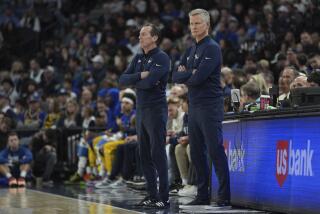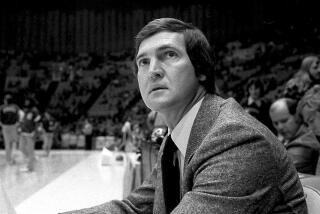Zensational Day
Some scenes are hard to grasp, no matter how much we’ve been prepared.
Reports that the Lakers were going to sign Phil Jackson surfaced almost a week ago. Even after the word came on Tuesday that it was a done deal, it still didn’t seem entirely real when Jackson stepped to a lectern at the Beverly Hills Hilton, after Jerry West introduced him as the newest coach of the Los Angeles Lakers.
Was this actually happening? Phil Jackson, with the Lakers? Phil Jackson, a California dude?
The two public images of Jackson are the long-haired playing days with the New York Knicks and the glasses, double-breasted suits and suspenders he wore as the coach of the Chicago Bulls. They are like parts of a slide show on the progression of the Baby Boomers.
Now the next step. The logical step. To move on, he had to complete his hat trick of the nation’s largest markets and come to Los Angeles, to a city and a state poised at the vanguard of the new millennium.
This is a town for people with a notion, an idea, a lot of hope. If I can just get the right agent and he can get me the right audition it will all fall into place.
Jackson had a notion too. If he could just bring his coaching style and his system to the talent-rich Lakers, it would all fall into place.
And--get this--he doesn’t want to be the producer, doesn’t demand his name above the title in the credits. All he wants to do is direct. At a time when even college coaches can come in and demand general manager duties and final say, Jackson will stick to coaching.
“I had to look at who I am, what I can do,” Jackson said. “I have enough energy to coach and to put my energy behind the team. And I don’t need the excess energy wasted on agents, on being the guy that makes the last call. I trust people to do the best at their job. I like to use people for what they can do, my whole staff, assistant coaches. I don’t really think I need all that power and whatever else goes with it, the money.
“I don’t want to be on the job 24 hours a day, seven days a week. I want to be able to take three months off in the summertime.”
Because he has done his job well, Jackson’s summers tend to be short. He worked in the NBA’s last game, usually about two months after the regular season ended, for six of the last eight years. But after the Bulls’ dynasty came to a contentious end and the key participants scattered around the country, Jackson had a chance for extended time off.
“For me it was a very long year,” Jackson said. “Obviously it was something that was definitely new. I moved out of Chicago to Upstate New York. I was able to do a variety of things. I was able to take a winter vacation, which I had never done in my life. And it was spent doing some things for [presidential candidate and former Knick teammate] Bill Bradley and his campaign.
“It was very interesting for me just to be kind of a private citizen, so to speak. That was very good. It was very good for me, very good for my family, very good for the relationships that I’ve had with my family. It was very invigorating for me to feel like I can go back and come to this game with a lot more energy than I ever thought I could come back to.”
This is a more relaxed Phil Jackson than we’re used to seeing. Sometimes he can be impatient with the media. He had one postgame news conference that lasted exactly 37 seconds (mitigating factor: It was after that horrible Hue Hollins call against the Knicks in the 1994 playoffs).
Wednesday he calmly fielded questions for about 30 minutes, then spent another half-hour talking to every television reporter in the city, one by one. It was Jackson at his best.
I wish I could say the same for the people asking the questions. There was the one furry-hatted radio clown and another Howard Stern wannabe, plus some guy who looked as if he wandered in from somewhere--each more intent on advancing his own agenda than gaining insight from Jackson.
Jackson handled it all in stride. He remained dignified even when the questions weren’t. You have to realize, nothing he deals with here will be as frenzied and hectic as what he underwent during the last three years in Chicago.
No mesh of egos will be as complicated and tangled as the super-superstar Michael Jordan, the loony Dennis Rodman, the emotionally fragile Scottie Pippen and the enigmatic Toni Kukoc. It was played out in a city that is much more ravenous about its sports teams and before the watchful eyes of the national and international media.
Jackson can do this. All of this.
When asked if he is an L.A. guy, Jackson said: “I can practice singing ‘I Love L.A.’ Maybe that’ll help. But I do like the beach, and I’m looking forward to warm weather. I spent a lot of my career in New York. I’ve been in Chicago for over a decade, so it’s about time I got to the West and to the other big city in America.”
Jackson fits into just about every niche this city has to offer.
You want diversity? He gives you Buddhism, Christianity and Native American folklore in one source.
You want the local industry? He wrote a one-act play that was performed in Chicago; now that he’s here he’ll have to start selling the screen rights.
He won’t find wide-open spaces like his summer home in Montana, but he might find a few houses near Montana Avenue in Santa Monica that he would like.
One day into the job and it looked as though Jackson will adapt quite well. Just sing along, Phil: “Century Boulevard . . . We love it! Victory Boulevard . . . We love it! Santa Monica Boulevard . . .”
J.A. Adande can be reached at his e-mail address: j.a.adande@latimes.com.
More to Read
All things Lakers, all the time.
Get all the Lakers news you need in Dan Woike's weekly newsletter.
You may occasionally receive promotional content from the Los Angeles Times.







